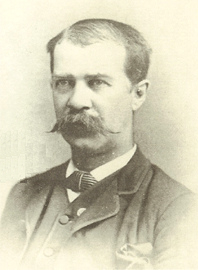
Back Dyer Lum German Dyer Lum Spanish Dyer D. Lum French Dyer Lum ID Dyer Lum Swedish Dyer Lum Turkish
Dyer Lum | |
|---|---|
 Lum in 1876 | |
| Born | Dyer Daniel Lum February 15, 1839 Geneva, New York, United States |
| Died | April 6, 1893 (aged 54) Bowery, New York City, United States |
| Cause of death | Suicide by poisoning |
| Resting place | Northampton, Massachusetts |
| Years active | 1861–1892 |
| Era | Gilded Age |
| Notable work |
|
| Political party | Greenback Party (1875–1880) |
| Other political affiliations |
|
| Movement | Labor movement, anarchism in the United States |
| Partner | Voltairine de Cleyre |
| Children | 2 |
| This article is part of a series on |
| Anarchism in the United States |
|---|
 |
Dyer Daniel Lum (February 15, 1839 – April 6, 1893) was an American labor activist, economist and political journalist. He was a leading figure in the American anarchist movement of the 1880s and early 1890s, working within the organized labor movement and together with individualist theorists.
Born into an abolitionist family, Lum voluntarily enlisted in the Union Army during the American Civil War, in which he fought for the abolition of slavery. After the war, he plied his trade as a bookbinder in New England and became involved in the nascent spiritualist movement, although he soon became skeptical of organized religion and converted to Buddhism. At this time, he became involved in the growing political reform movement, joining the Greenback Party and lobbying for the institution of the eight-hour day, as well as monetary and land reforms.
By the early 1880s, he had become disillusioned by third party politics and moved towards revolutionary socialism and individualist anarchism. He joined the International Working People's Association (IWPA) and the Knights of Labor, within which he advocated for workers organization to push for economic reform and political revolution. Lum was deeply affected by the Haymarket affair, as he was close friends with many of the defendants, including Albert Parsons, Adolph Fischer and Louis Lingg, the latter of whom he helped commit suicide in order to avoid execution. Lum's involvement in the affair became a source of criticism from Chicago anarchists, who accused him of displaying a cavalier attitude towards revolutionary martyrdom, as well as the individualist Boston anarchists, who were alienated by his advocacy of revolutionary violence. Lum attempted to use his position to bridge the divide between the two factions, but was ultimately unsuccessful.
After Haymarket, he moved away from advocating violent revolution and became more closely involved in trade union organizing, which he thought provided a means through which to achieve a free association of producers and anarchy. He became an influential figure within the American Federation of Labor (AFL), encouraging its anti-political stance and practice of voluntary association. At this time, he developed a political programme that called for the implementation of mutualist economics through workers' organization and revolutionary tactics. But by the early 1890s, he was overcome by depression and suicidal ideations. He committed suicide in 1893, months before the pardoning of the Haymarket defendants.